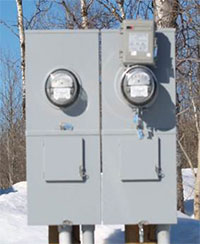Fixed Off-Peak
Formerly Controlled Access
Storage Heating Rate
The Fixed Off-Peak rate is designed around the ability to store energy for space and water heating. During off-peak hours from 10 p.m. to 6 a.m., when the cost of electricity and system demand is less, storage heating equipment turns on and stores the energy needed for the balance of the day. A storage system can consist of thermal storage room units, a central storage furnace, a central hot water system or slab heat. Water heating on the storage rate generally requires a minimum of one 80-gallon electric water heater or two 52-gallon electric water heaters. Larger combinations may be necessary depending on hot water demand. Electricity to energize the heating equipment is on only between 10 p.m. and 6 a.m. This system is also known as controlled access or “ETS” (electric thermal storage).

Residential
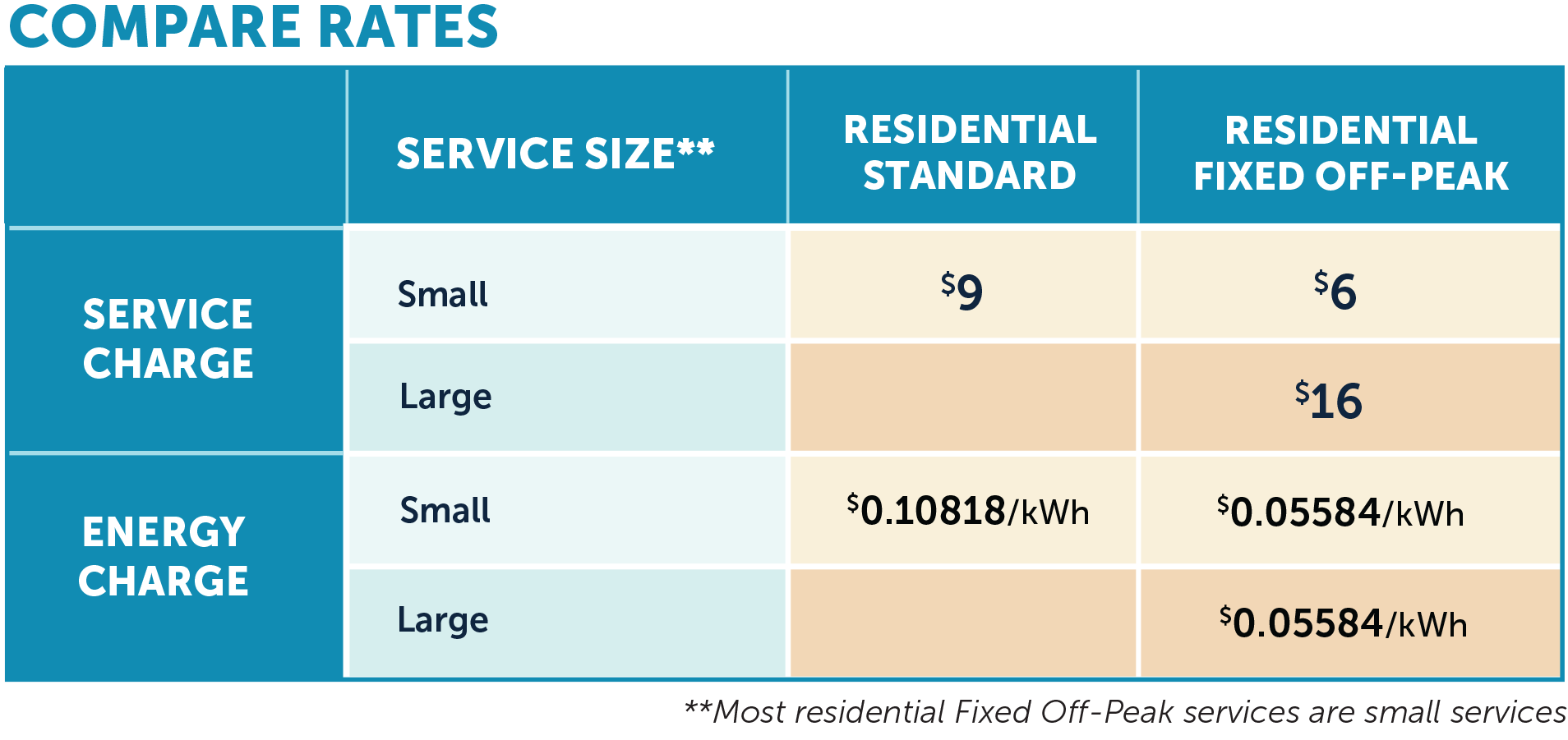
Commercial
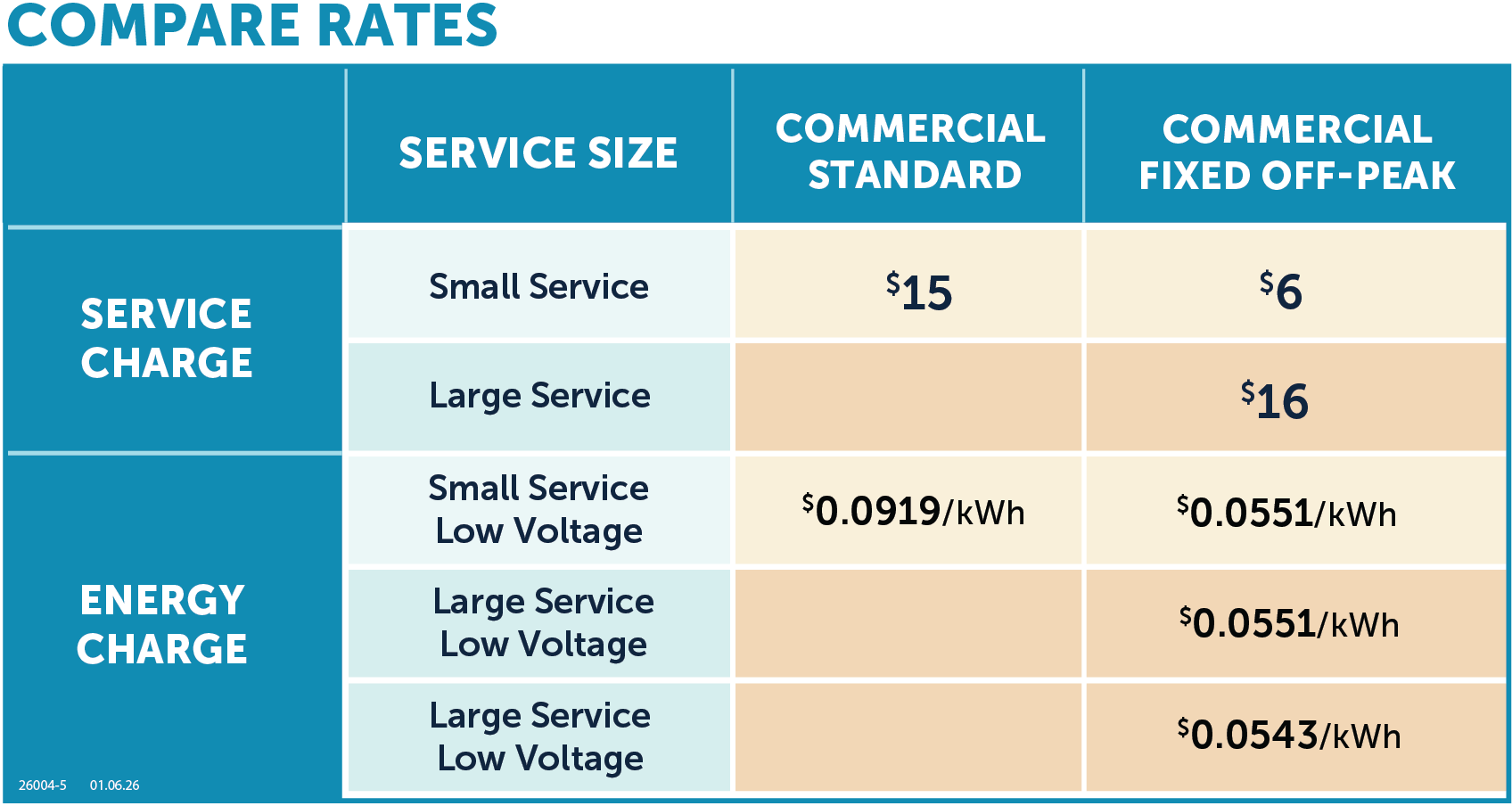
Fixed Off-Peak Guide
Electric Heat
Electric heat offers many benefits
- There’s no flame, which means less fire hazard and no combustion by-products that could present an indoor air quality concern.
- Eliminates sooting, back-drafting or fuel handling.
- Individual room units provide precise room-by-room temperature control to fit your lifestyle, save energy and allow for individual comfort. Electrical heat lets you put the right amount of heat exactly where you need it.
- In most cases, there are no, or a limited number, of moving parts.
- Installation and maintenance costs are low, and competitive Dual Fuel and Fixed Off-Peak storage rates make electric heat economical.
-
Electric heating is very versatile and can offer many heating options to meet your needs, such as:
- Radiant heat, e.g., cover heaters, ceiling panels, radiant slab heating
- Conventional heat, e.g., baseboards and boilers
- Fan forced heat, e.g., electric furnaces, plenum heaters, wall heaters, kickspace heaters, floor heaters, air source heat pumps and ground source heat pumps
- Electric heating offers a high degree of reliability with time-tested, proven heating technology. Electric heating is considered to be one of the most reliable systems available today.
Fixed Off-Peak
Conditions:
To qualify for the Fixed Off-Peak rate, you must have sufficient storage capacity to meet your building's space or water heating needs. The homeowner or business owner will receive a Fixed Off-Peak Agreement and the tax-exempt card after the meter is installed (all heating fuels in the state of Minnesota are tax-exempt).
How to Participate:
Call Minnesota Power at 1-800-228-4966 for more information on the Fixed Off-Peak program.
Electric Storage Heating Equipment
Room Storage Heater
Room storage heaters can easily be installed during new construction or remodeling projects and easily retrofitted into existing homes or businesses. A fan circulates stored heat into the room when the thermostat calls for heat. Each room storage heater is individually controlled so you can adjust the temperature in each room.
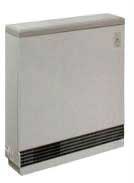
Electric Storage Furnace
Is a central forced air heating system that utilizes high density ceramic bricks to store heat during off peak hours And is designed to meet 100% of your heating needs.
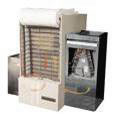
Electric Storage Boiler
A central hot water system that stores heat during off- peak hours, and is designed to meet 100% of your heating needs.
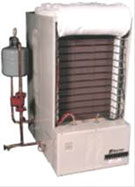
Radiant Slab Heating
Radiant slab systems are designed for sub-floor or under-slab installation and can be used on any electric rate Heating is provided by either a specially designed electrical resistance cable or by plastic tubing in conjunction with a hot water boiler. This option eliminates interference with furniture placement and design. If this installation is to be used with the Fixed Off-Peak rate it has to be properly designed by your heating contractor so that enough thermal mass and energy are stored during the 8 hour charge time (10 p.m. to 6 a.m.) to deliver heat to your living space for the remainder of the day.
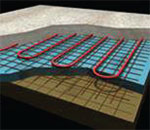
Storage Water Heating
A storage water heating system is one which has sufficient storage capacity to supply the residential or commercial customer with the hot water needed, while only heating between 10:00 p.m. to 6:00 a.m. The system is remotely controlled and the water heater elements will not operate at any other time. The water heater must have a minimum storage capacity of 80 gallons.
Recommendations for sizing:
| Number in Family | Single Tank | Dual Tanks | Dual Tanks |
|---|---|---|---|
| 1 | 80 | 52-52 | |
| 2 | 80 | 52-52 | |
| 3 | 120 | 52-52 | |
| 4 | 120 | 52-52 | |
| 5 | 52-82 | 52-66 | |
| 6 | 52-82 | 66-82 | |
| 7 | 52-120 | 82-82 | |
| 8 | 52-120 | 82-82 | |
| 9 | 82-120 |
200 gallons is the maximum amount of water that a 4 5 kw element will heat in an eight-hour charge period. Storage heating is not recommended for families of 10 or more. Families may have to adjust their hot water usage with faucet aerators, water saver showerheads, mixing valves, cold or warm wash for clothes, etc.
Fixed Off-Peak FAQs
Q. What is the cost of installing a Fixed Off-Peak System?
A. The costs can vary greatly depending on the individual installation. A mechanical heating contractor is normally hired to install your storage heating equipment. An electrician will need to install a second service panel - one panel will have circuits for general household/business use; the second panel will have only the electric heating circuits. This means two separate meters are required For services 200 amps and less, a radio receiver and socket interrupter or integral meter contactor will be installed by Minnesota Power. For services over 200 amps, an electrician needs to work with Minnesota Power’s metering personnel to install a proper interruptible control system. The cost to upgrade Minnesota Power’s distribution system facilities to accommodate your additional electric heating load can consist of but may not be limited to a transformer, wire, and meter disconnects in applicable installations, and a radio receiver and socket interrupter or integral meter contactor to control the heating service.
Q. How do I qualify for Fixed Off-Peak?
A. To qualify, you must have a means of storing sufficient heating energy to meet your building's needs.
Q. What do I do if I want to discontinue being on the Fixed Off-Peak rate?
A. If you want to discontinue Fixed Off-Peak, you will not be allowed to return to the Fixed Off-Peak rate for a minimum of 12 months. If you wish to discontinue this rate, you can request this rate change. Minnesota Power will disable the radio control. If the Fixed Off-Peak meter can be removed (no electric equipment requiring power is wired into the Fixed Off-Peak electrical panel), Minnesota Power will do so. If the meter is not removed, you will continue to be billed a monthly service charge. To avoid that charge, transfer all electric heating circuits to the general service panel. If you have had a lot line metering pedestal installed, and decide you no longer want Fixed Off-Peak, the Fixed Off-Peak pedestal may need to be removed at a cost to you. The cost to remove our facilities varies based on individual installations. You would need to contact the Fixed Off-Peak Coordinator for these costs and sign an Interruptible Service Disconnect Request.
Space Heating Comparisons
| Type of Heating Appliance | Electricity | Gas/Propane | Oil | Wood |
|---|---|---|---|---|
| Boiler | ||||
| Forced Air | ||||
| Plenum | ||||
| Baseboard (non-hydronic) | ||||
| Radiant Cove | ||||
| Slab | ||||
| Slab Storage | ||||
| Heat Pump | ||||
| Convection Heater |
| Operation/Maintenance | Electricity | Gas/Propane | Oil | Wood |
|---|---|---|---|---|
| Precise Room-by-room Control | ||||
| Moving Parts | ||||
| Fuel Handling Required | ||||
| Regular Maintenance required | ||||
| Venting Required |
Meter Requirements
Bypass Metering Requirements
If Lot Line Metering is Not Used
In order to minimize power interruptions during meter replacement or calibration, and to ensure safety of Minnesota Power employees, all residential, customer-owned, self contained meter sockets must have a jaw-clamping, lever-type bypass. Horn-type bypasses are not acceptable.
Self Contained Metering
200-Amp Single-Phase 3-Wire—4 or 5 terminal, 200-amp, jaw-clamping, lever-operated bypass, weatherproof, ringless, screwless cover, 5th jaw at nine o’clock position, hub opening for overhead, closure plate or plain top for underground.
320-Amp Single-Phase 3-Wire—4 terminal, 320-amp, jaw-clamping, lever-operated bypass, weatherproof, ringless, screwless cover, hub opening for overhead, closure plate or plain top for underground Anti-inversion clips in the upper right jaw are not allowed.
200 Amp 2 Position Single Phase 3 Wire—4 terminal, weatherproof, 200-amp jaw-clamping, lever-operated bypass per position, ringless, screwless cover, hub opening for overhead, closure plate or plain top for underground.
Approved Meter Sockets—List of Manufacturers
Landis and Gyr, Milbank, T&B, Anchor, Durham, Siemens, Square D, Cutler Hammer and Midwest Electric are examples of UL approved metering equipment providers.
Sample Part Numbers
Millbank U-4801-XL-5T9
Siemens Drawing 48804, PN 48804-02NU
Sample Meter Spec
*Note: Metering services greater than 320A and in excess of 240V require instrument-rated metering equipment.
Meter Location
Outdoor metering is required for all installations unless prior approval is given.
For outdoor installations the center line of all meters shall be between four and six feet from the finished grade.
A minimum three feet of unobstructed working space, as measured from the surface on which it is mounted, should be maintained in front of the meter, and a minimum of 12 inches of unobstructed space should be maintained on all sides of the meter cover Ample space shall be provided for all meters, metering equipment and other apparatus so that they can be safely read, inspected and tested.
Please call Minnesota Power’s Meter Department at 1-800-228-4966 for questions regarding sockets.
*Note: Your local or state electrical code may have additional requirements.
Meter Installation Examples
Overhead Style
Parallel Mast
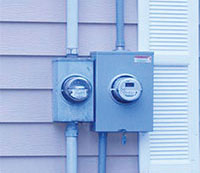
Underground or Overhead
Style 2 Position Meter Base
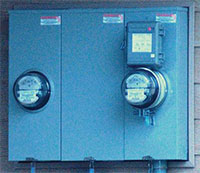
Minnesota Power Underground
Lot Line Meter Base Installation
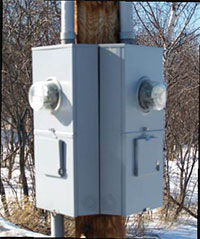
Minnesota Power Overhead
Lot Line Meter Base Installation
